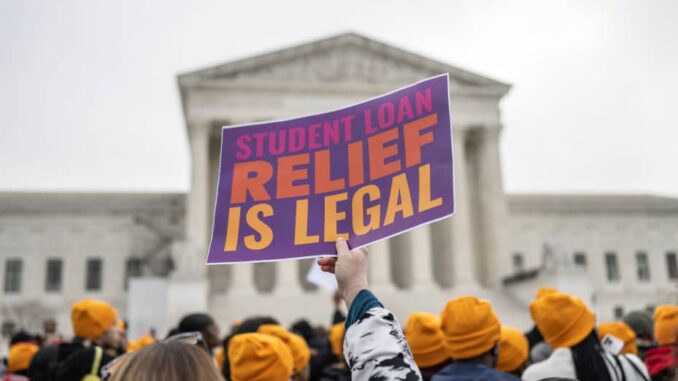
As the ongoing debate on student loan debt cancellation rages on, the issue has now made its way to the Supreme Court. With the Biden administration seeking to cancel student loan debt and borrowers eagerly awaiting a decision, there are several things to watch out for. In this post, we’ll explore the background of the issue, legal basis for debt cancellation, the Supreme Court cases, implications for borrowers, impact on the payment pause, and what borrowers can do now.
Recommended: Do I Need My Spouse’s Signature on a Mortgage in Florida? Can I refinance my car loan with the same bank?
Overview of the Student Debt Cancellation Issue
The student loan debt crisis has been a topic of discussion for years, with outstanding student debt in the United States surpassing $1.7 trillion. Advocates for debt cancellation argue that it will provide much-needed relief to millions of borrowers who are struggling to make ends meet, while opponents argue that it would be unfair to taxpayers who would foot the bill. The debate has intensified since President Biden took office and began calling for up to $10,000 in student loan forgiveness per borrower.
Legal Basis for Student Debt Cancellation
The legal basis for student loan debt cancellation is a complex issue that has been the subject of much debate. While the Higher Education Act does grant the Secretary of Education broad authority to “enforce, pay, compromise, waive, or release any right, title, claim, lien, or demand, however acquired, including any equity or any right of redemption,” it is unclear whether this authority extends to canceling student loan debt without approval from Congress. The Supreme Court will have to decide whether the President has the legal authority to cancel student loan debt through executive action.
The Supreme Court Cases
There are currently two cases before the Supreme Court related to student loan debt cancellation. Biden v. Nebraska challenges the legality of the Biden administration’s use of executive action to cancel student loan debt, while Department of Education v. Brown seeks to limit the amount of loan forgiveness that borrowers can receive under the Public Service Loan Forgiveness program. The Supreme Court’s decision in these cases could have far-reaching implications for millions of borrowers.
Implications for Borrowers
The implications for borrowers if the Supreme Court rules in favor or against student loan debt cancellation are significant. If the Court upholds the Biden administration’s use of executive action, borrowers could see a significant reduction in their outstanding student loan balances. However, if the Court rules against debt cancellation, borrowers could be left with the burden of repaying their loans in full. Additionally, the decision could impact the credit scores of borrowers, making it more difficult for them to access credit in the future.
Impact on the Payment Pause
The current payment pause on student loan debt has provided much-needed relief to borrowers who are struggling to make ends meet. However, the Supreme Court’s decision could impact the duration of the payment pause or even end it altogether. Borrowers should stay informed about the latest developments and be prepared to resume payments if the pause is lifted.
What Borrowers Can Do Now
While borrowers await the Supreme Court’s decision, there are several things they can do to manage their student loan debt. Exploring refinancing options, seeking assistance from loan servicers, and staying informed about the latest developments are all important steps that borrowers can take. Additionally, they can check out resources like to stay up to date on their options and get expert advice on managing their debt.
In conclusion, the Supreme Court’s decision on student loan debt cancellation could have significant implications for millions of borrowers. While the issue remains complex and contentious, borrowers should stay informed and be prepared to take action based on the outcome of the cases before the Court.
Leave a Reply